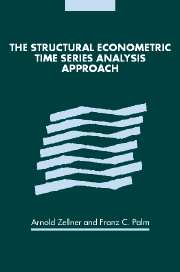Book contents
- Frontmatter
- Contents
- List of contributors
- Acknowledgments
- Introduction
- Part I The SEMTSA approach
- Part II Selected applications
- 6 Time series and structural analysis of monetary models of the US economy (1975)
- 7 Time series versus structural models: a case study of Canadian manufacturing inventory behavior (1975)
- 8 Time series analysis of the German hyperinflation (1978)
- 9 A time series analysis of seasonality in econometric models (1978)
- 10 The behavior of speculative prices and the consistency of economic models (1985)
- 11 A comparison of the stochastic processes of structural and time series exchange rate models (1987)
- 12 Encompassing univariate models in multivariate time series: a case study (1994)
- Part III Macroeconomic forecasting and modeling
- Part IV Disaggregation, forecasting, and modeling
- Subject index
- Author index
- References
10 - The behavior of speculative prices and the consistency of economic models (1985)
Published online by Cambridge University Press: 24 October 2009
- Frontmatter
- Contents
- List of contributors
- Acknowledgments
- Introduction
- Part I The SEMTSA approach
- Part II Selected applications
- 6 Time series and structural analysis of monetary models of the US economy (1975)
- 7 Time series versus structural models: a case study of Canadian manufacturing inventory behavior (1975)
- 8 Time series analysis of the German hyperinflation (1978)
- 9 A time series analysis of seasonality in econometric models (1978)
- 10 The behavior of speculative prices and the consistency of economic models (1985)
- 11 A comparison of the stochastic processes of structural and time series exchange rate models (1987)
- 12 Encompassing univariate models in multivariate time series: a case study (1994)
- Part III Macroeconomic forecasting and modeling
- Part IV Disaggregation, forecasting, and modeling
- Subject index
- Author index
- References
Summary
Introduction
Modern financial economic theory suggests that changes in speculative prices should follow simple time series processes in an informationally efficient capital market. Moreover, this theoretical implication enjoys substantial support in the empirical financial economic literature (see Fama 1970). Yet, the implications of the observed time series behavior of speculative price changes for the structure of equilibrium models of asset pricing or information theory do not appear to be fully appreciated. Simply stated, financial economists have not attempted to integrate time series analysis with econometric model building along the lines suggested by Zellner (1979b) and Zellner and Palm (1974).
Changes in speculative prices in an efficient capital market: theory and evidence
Fama (1970) has defined an efficient capital market as one in which speculative prices fully (and correctly) reflect available information. In such a market, changes in speculative prices occur only in response to new information or to reassessments of existing information. The pioneering empirical work of Working (1934), Kendall (1953), Roberts (1959), and Bachelier (1964) suggested that changes in various speculative price series appeared to follow simple time series processes or “fair game” models (in particular, random or quasi-random walks). Excepting Bachelier, the first rigorous economic theory consistent with the above empirical evidence was developed by Samuelson (1965).
Samuelson demonstrates that changes in futures prices will follow martingale or submartingale processes under very general assumptions concerning the stochastic behavior of spot commodity prices.
Information
- Type
- Chapter
- Information
- The Structural Econometric Time Series Analysis Approach , pp. 397 - 404Publisher: Cambridge University PressPrint publication year: 2004
